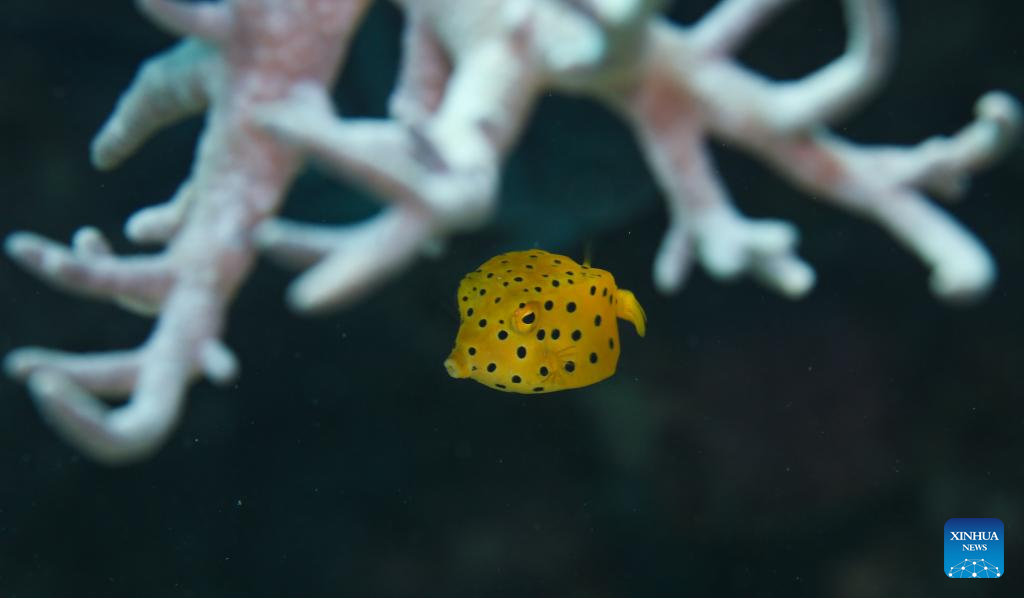
A yellow boxfish, Ostracion cubicus, is pictured in the Wuzhizhou Island's marine ranch in Sanya, south China's Hainan Province, May 15, 2024. Wuzhizhou Island's marine ranch, China's first tropical marine ranch, has made remarkable strides in marine ecological restoration and fishery resource conservation.
Artificial reefs are utilized worldwide to enhance ocean ecology, by creating additional habitats for local aquatic organisms and fish. As of April 2024, the marine ranch has deployed approximately 80,000 cubic meters of artificial reefs and ship-reefs. These efforts have created a thriving marine ecosystem, complete with coral reefs, fish, shrimp and shellfish.
Statistics reveal that over 51,000 corals have been successfully transplanted in the waters around Wuzhizhou Island. The area is now home to more than 300 species of coral reef fish, showcasing the rich biodiversity that has been nurtured through these conservation efforts. (Xinhua/Yang Guanyu)
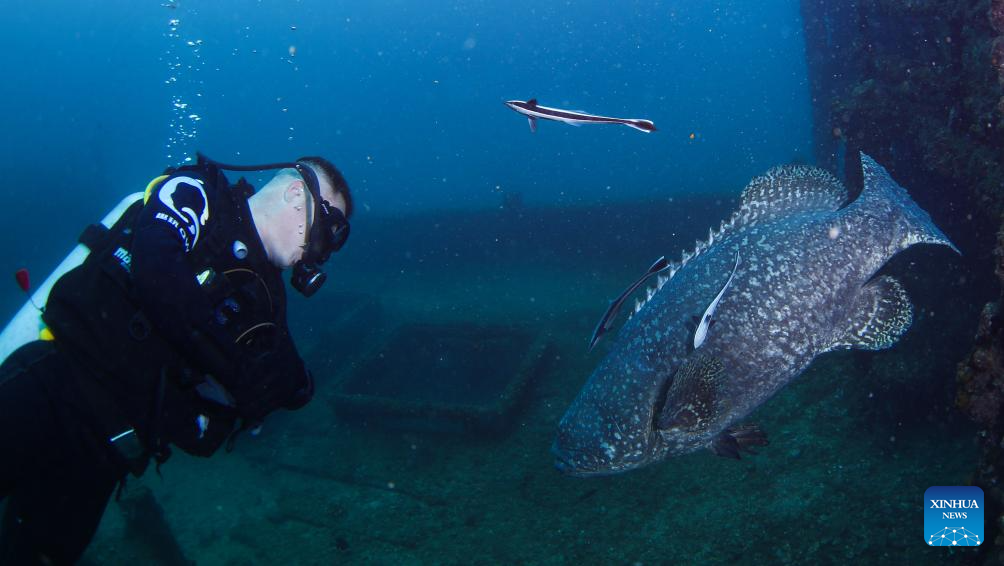
A grouper is pictured in the Wuzhizhou Island's marine ranch in Sanya, south China's Hainan Province, May 17, 2024. Wuzhizhou Island's marine ranch, China's first tropical marine ranch, has made remarkable strides in marine ecological restoration and fishery resource conservation.
Artificial reefs are utilized worldwide to enhance ocean ecology, by creating additional habitats for local aquatic organisms and fish. As of April 2024, the marine ranch has deployed approximately 80,000 cubic meters of artificial reefs and ship-reefs. These efforts have created a thriving marine ecosystem, complete with coral reefs, fish, shrimp and shellfish.
Statistics reveal that over 51,000 corals have been successfully transplanted in the waters around Wuzhizhou Island. The area is now home to more than 300 species of coral reef fish, showcasing the rich biodiversity that has been nurtured through these conservation efforts. (Xinhua/Yang Guanyu)
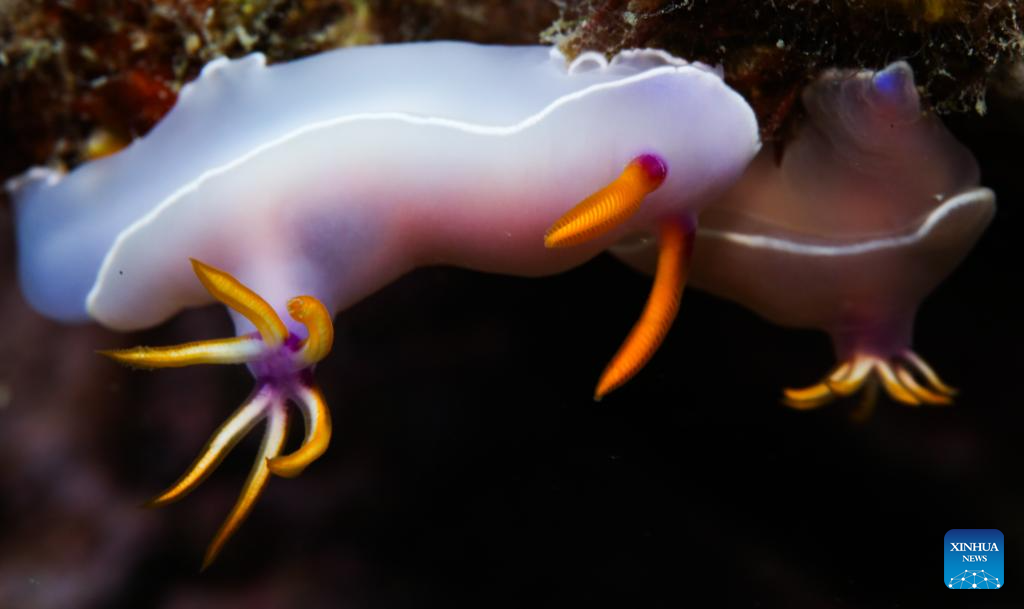
Sea slugs are pictured in the Wuzhizhou Island's marine ranch in Sanya, south China's Hainan Province, May 16, 2024. Wuzhizhou Island's marine ranch, China's first tropical marine ranch, has made remarkable strides in marine ecological restoration and fishery resource conservation.
Artificial reefs are utilized worldwide to enhance ocean ecology, by creating additional habitats for local aquatic organisms and fish. As of April 2024, the marine ranch has deployed approximately 80,000 cubic meters of artificial reefs and ship-reefs. These efforts have created a thriving marine ecosystem, complete with coral reefs, fish, shrimp and shellfish.
Statistics reveal that over 51,000 corals have been successfully transplanted in the waters around Wuzhizhou Island. The area is now home to more than 300 species of coral reef fish, showcasing the rich biodiversity that has been nurtured through these conservation efforts. (Xinhua/Yang Guanyu)
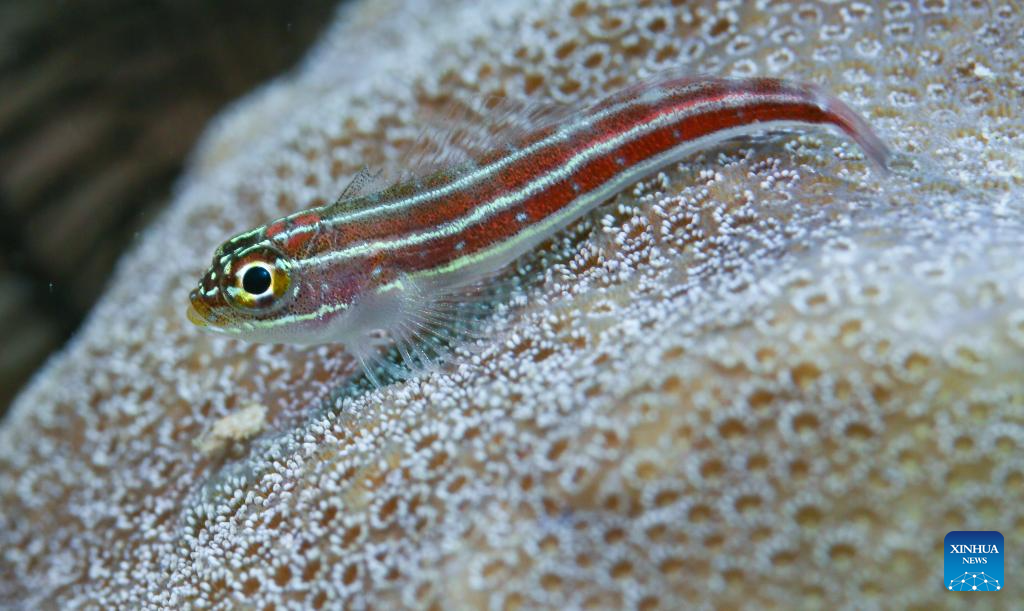
A tropical striped triplefin is pictured in the Wuzhizhou Island's marine ranch in Sanya, south China's Hainan Province, May 16, 2024. Wuzhizhou Island's marine ranch, China's first tropical marine ranch, has made remarkable strides in marine ecological restoration and fishery resource conservation.
Artificial reefs are utilized worldwide to enhance ocean ecology, by creating additional habitats for local aquatic organisms and fish. As of April 2024, the marine ranch has deployed approximately 80,000 cubic meters of artificial reefs and ship-reefs. These efforts have created a thriving marine ecosystem, complete with coral reefs, fish, shrimp and shellfish.
Statistics reveal that over 51,000 corals have been successfully transplanted in the waters around Wuzhizhou Island. The area is now home to more than 300 species of coral reef fish, showcasing the rich biodiversity that has been nurtured through these conservation efforts. (Xinhua/Yang Guanyu)
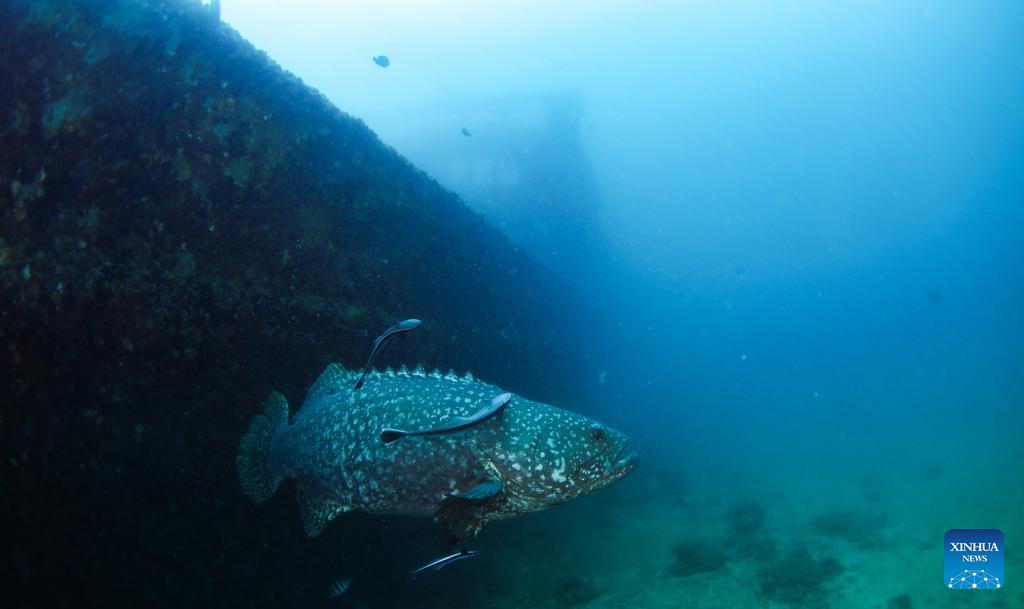
A grouper is pictured in the Wuzhizhou Island's marine ranch in Sanya, south China's Hainan Province, May 17, 2024. Wuzhizhou Island's marine ranch, China's first tropical marine ranch, has made remarkable strides in marine ecological restoration and fishery resource conservation.
Artificial reefs are utilized worldwide to enhance ocean ecology, by creating additional habitats for local aquatic organisms and fish. As of April 2024, the marine ranch has deployed approximately 80,000 cubic meters of artificial reefs and ship-reefs. These efforts have created a thriving marine ecosystem, complete with coral reefs, fish, shrimp and shellfish.
Statistics reveal that over 51,000 corals have been successfully transplanted in the waters around Wuzhizhou Island. The area is now home to more than 300 species of coral reef fish, showcasing the rich biodiversity that has been nurtured through these conservation efforts. (Xinhua/Yang Guanyu)
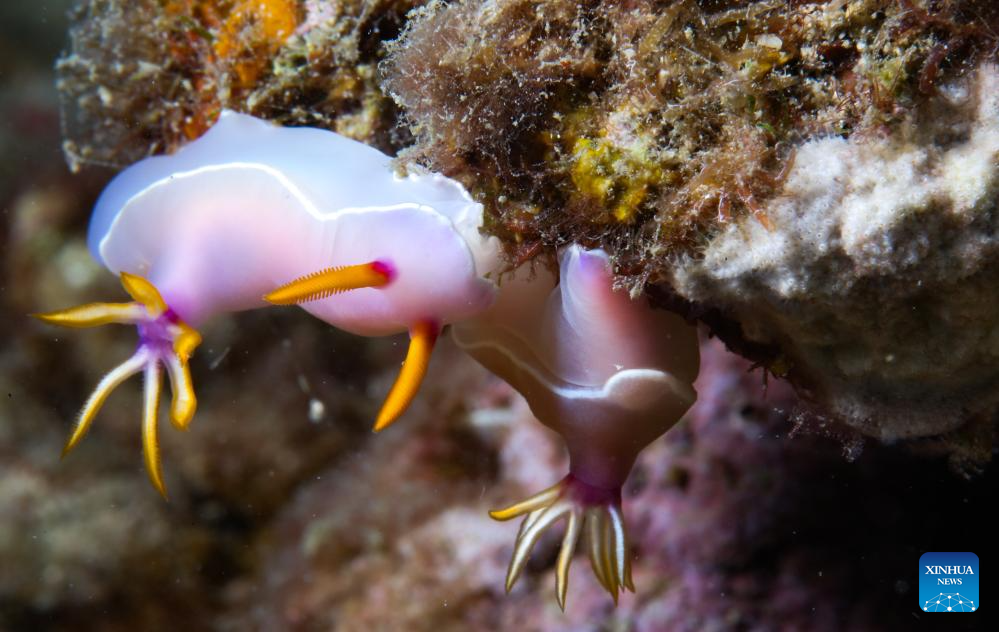
A sea slug is pictured in the Wuzhizhou Island's marine ranch in Sanya, south China's Hainan Province, May 16, 2024. Wuzhizhou Island's marine ranch, China's first tropical marine ranch, has made remarkable strides in marine ecological restoration and fishery resource conservation.
Artificial reefs are utilized worldwide to enhance ocean ecology, by creating additional habitats for local aquatic organisms and fish. As of April 2024, the marine ranch has deployed approximately 80,000 cubic meters of artificial reefs and ship-reefs. These efforts have created a thriving marine ecosystem, complete with coral reefs, fish, shrimp and shellfish.
Statistics reveal that over 51,000 corals have been successfully transplanted in the waters around Wuzhizhou Island. The area is now home to more than 300 species of coral reef fish, showcasing the rich biodiversity that has been nurtured through these conservation efforts. (Xinhua/Yang Guanyu)
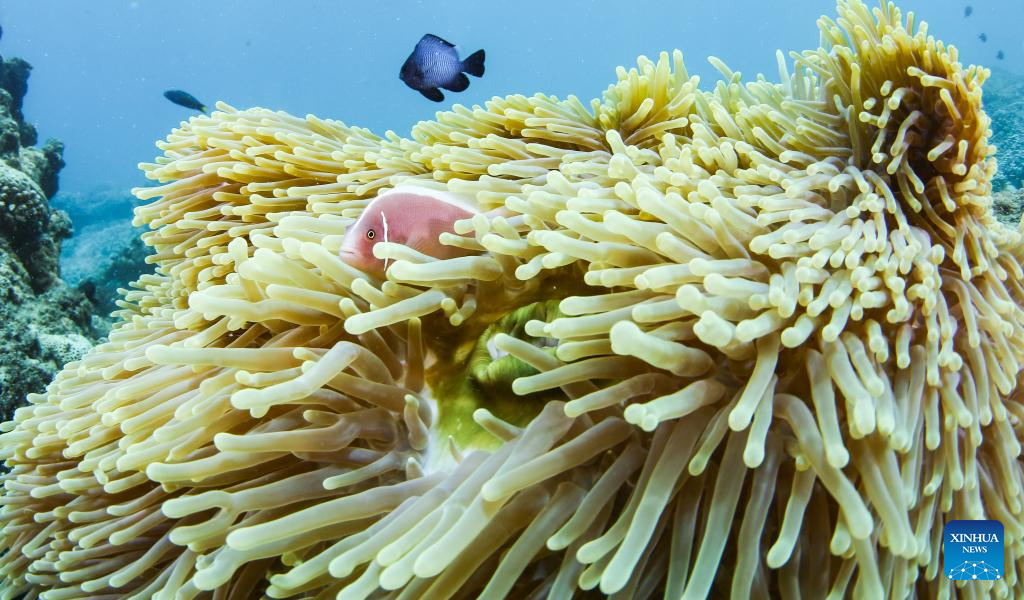
Sea anemones and a clownfish are pictured in the Wuzhizhou Island's marine ranch in Sanya, south China's Hainan Province, May 17, 2024. Wuzhizhou Island's marine ranch, China's first tropical marine ranch, has made remarkable strides in marine ecological restoration and fishery resource conservation.
Artificial reefs are utilized worldwide to enhance ocean ecology, by creating additional habitats for local aquatic organisms and fish. As of April 2024, the marine ranch has deployed approximately 80,000 cubic meters of artificial reefs and ship-reefs. These efforts have created a thriving marine ecosystem, complete with coral reefs, fish, shrimp and shellfish.
Statistics reveal that over 51,000 corals have been successfully transplanted in the waters around Wuzhizhou Island. The area is now home to more than 300 species of coral reef fish, showcasing the rich biodiversity that has been nurtured through these conservation efforts. (Xinhua/Yang Guanyu)
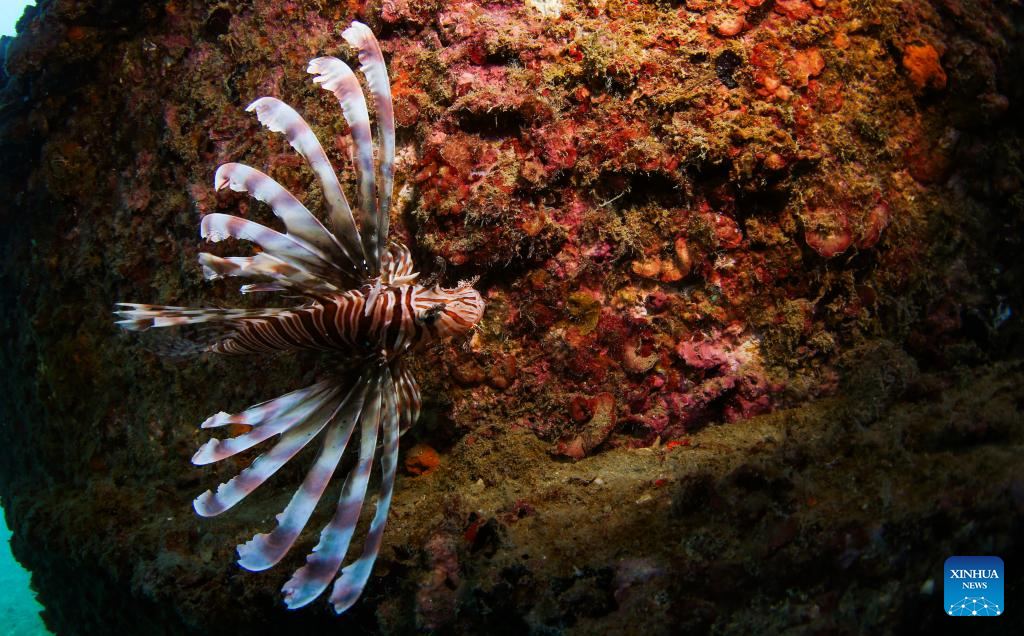
A lionfish is pictured in the Wuzhizhou Island's marine ranch in Sanya, south China's Hainan Province, May 17, 2024. Wuzhizhou Island's marine ranch, China's first tropical marine ranch, has made remarkable strides in marine ecological restoration and fishery resource conservation.
Artificial reefs are utilized worldwide to enhance ocean ecology, by creating additional habitats for local aquatic organisms and fish. As of April 2024, the marine ranch has deployed approximately 80,000 cubic meters of artificial reefs and ship-reefs. These efforts have created a thriving marine ecosystem, complete with coral reefs, fish, shrimp and shellfish.
Statistics reveal that over 51,000 corals have been successfully transplanted in the waters around Wuzhizhou Island. The area is now home to more than 300 species of coral reef fish, showcasing the rich biodiversity that has been nurtured through these conservation efforts. (Xinhua/Yang Guanyu)
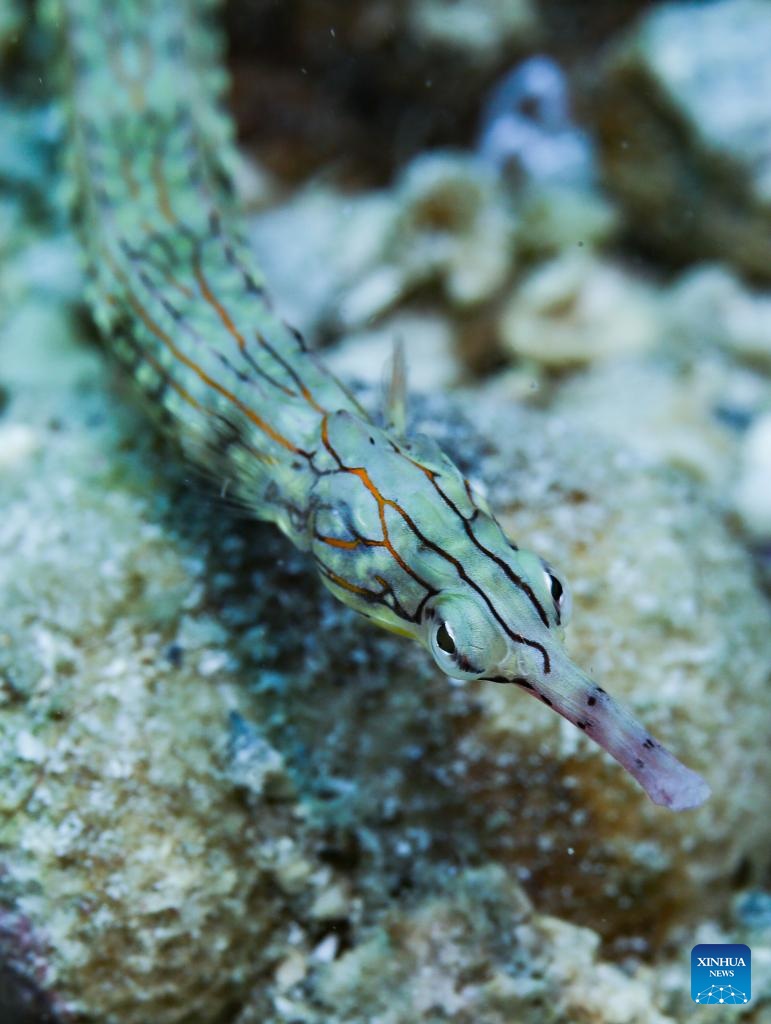
A messmate pipefish is pictured in the Wuzhizhou Island's marine ranch in Sanya, south China's Hainan Province, May 15, 2024. Wuzhizhou Island's marine ranch, China's first tropical marine ranch, has made remarkable strides in marine ecological restoration and fishery resource conservation.
Artificial reefs are utilized worldwide to enhance ocean ecology, by creating additional habitats for local aquatic organisms and fish. As of April 2024, the marine ranch has deployed approximately 80,000 cubic meters of artificial reefs and ship-reefs. These efforts have created a thriving marine ecosystem, complete with coral reefs, fish, shrimp and shellfish.
Statistics reveal that over 51,000 corals have been successfully transplanted in the waters around Wuzhizhou Island. The area is now home to more than 300 species of coral reef fish, showcasing the rich biodiversity that has been nurtured through these conservation efforts. (Xinhua/Yang Guanyu)
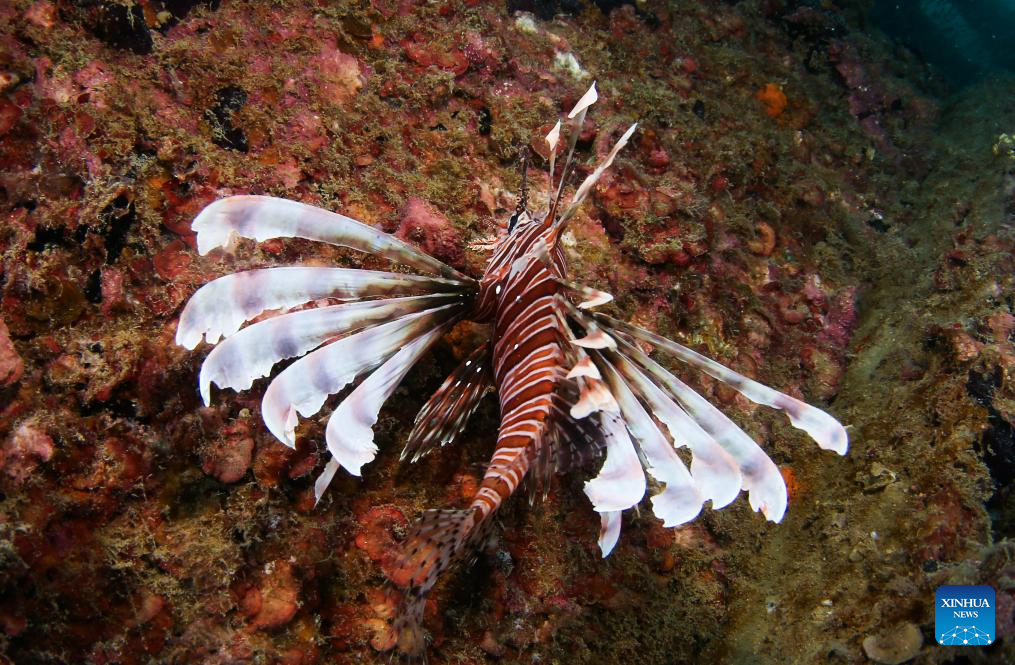
A lionfish is pictured in the Wuzhizhou Island's marine ranch in Sanya, south China's Hainan Province, May 17, 2024. Wuzhizhou Island's marine ranch, China's first tropical marine ranch, has made remarkable strides in marine ecological restoration and fishery resource conservation.
Artificial reefs are utilized worldwide to enhance ocean ecology, by creating additional habitats for local aquatic organisms and fish. As of April 2024, the marine ranch has deployed approximately 80,000 cubic meters of artificial reefs and ship-reefs. These efforts have created a thriving marine ecosystem, complete with coral reefs, fish, shrimp and shellfish.
Statistics reveal that over 51,000 corals have been successfully transplanted in the waters around Wuzhizhou Island. The area is now home to more than 300 species of coral reef fish, showcasing the rich biodiversity that has been nurtured through these conservation efforts. (Xinhua/Yang Guanyu)
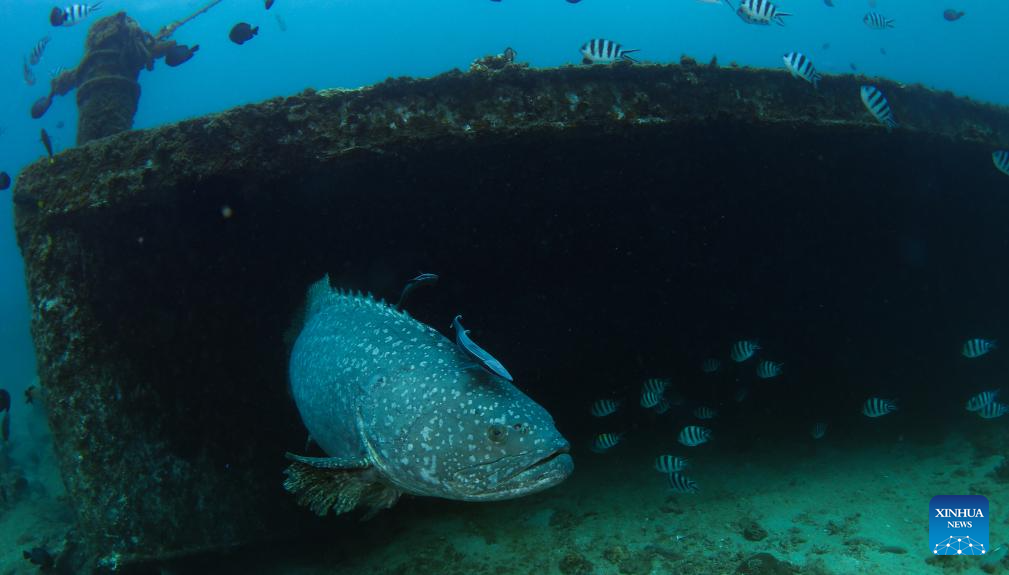
A grouper is pictured in the Wuzhizhou Island's marine ranch in Sanya, south China's Hainan Province, May 17, 2024. Wuzhizhou Island's marine ranch, China's first tropical marine ranch, has made remarkable strides in marine ecological restoration and fishery resource conservation.
Artificial reefs are utilized worldwide to enhance ocean ecology, by creating additional habitats for local aquatic organisms and fish. As of April 2024, the marine ranch has deployed approximately 80,000 cubic meters of artificial reefs and ship-reefs. These efforts have created a thriving marine ecosystem, complete with coral reefs, fish, shrimp and shellfish.
Statistics reveal that over 51,000 corals have been successfully transplanted in the waters around Wuzhizhou Island. The area is now home to more than 300 species of coral reef fish, showcasing the rich biodiversity that has been nurtured through these conservation efforts. (Xinhua/Yang Guanyu)
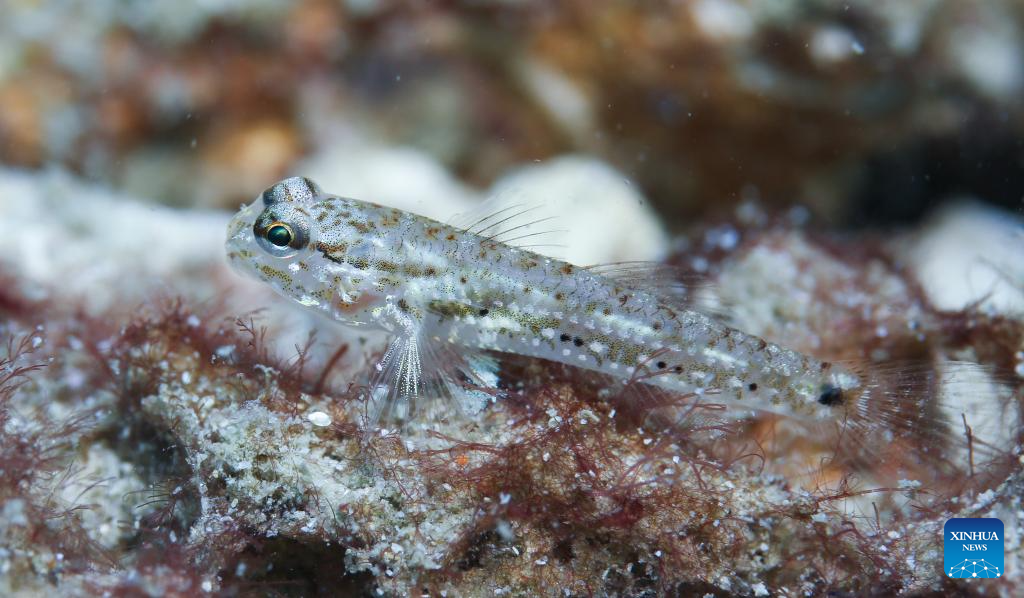
A goby fish is pictured in the Wuzhizhou Island's marine ranch in Sanya, south China's Hainan Province, May 15, 2024. Wuzhizhou Island's marine ranch, China's first tropical marine ranch, has made remarkable strides in marine ecological restoration and fishery resource conservation.
Artificial reefs are utilized worldwide to enhance ocean ecology, by creating additional habitats for local aquatic organisms and fish. As of April 2024, the marine ranch has deployed approximately 80,000 cubic meters of artificial reefs and ship-reefs. These efforts have created a thriving marine ecosystem, complete with coral reefs, fish, shrimp and shellfish.
Statistics reveal that over 51,000 corals have been successfully transplanted in the waters around Wuzhizhou Island. The area is now home to more than 300 species of coral reef fish, showcasing the rich biodiversity that has been nurtured through these conservation efforts. (Xinhua/Yang Guanyu)
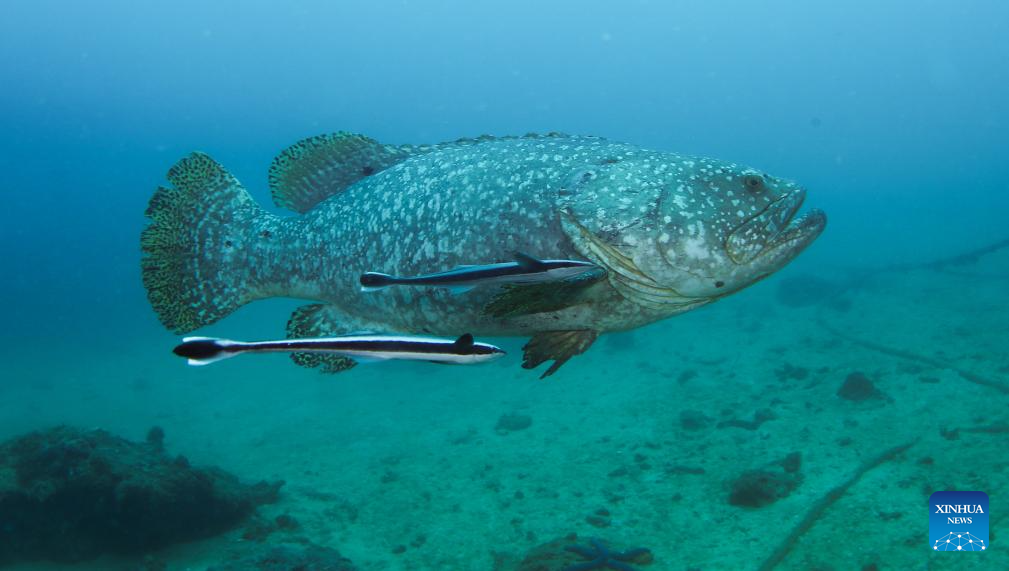
A grouper is pictured in the Wuzhizhou Island's marine ranch in Sanya, south China's Hainan Province, May 17, 2024. Wuzhizhou Island's marine ranch, China's first tropical marine ranch, has made remarkable strides in marine ecological restoration and fishery resource conservation.
Artificial reefs are utilized worldwide to enhance ocean ecology, by creating additional habitats for local aquatic organisms and fish. As of April 2024, the marine ranch has deployed approximately 80,000 cubic meters of artificial reefs and ship-reefs. These efforts have created a thriving marine ecosystem, complete with coral reefs, fish, shrimp and shellfish.
Statistics reveal that over 51,000 corals have been successfully transplanted in the waters around Wuzhizhou Island. The area is now home to more than 300 species of coral reef fish, showcasing the rich biodiversity that has been nurtured through these conservation efforts. (Xinhua/Yang Guanyu)
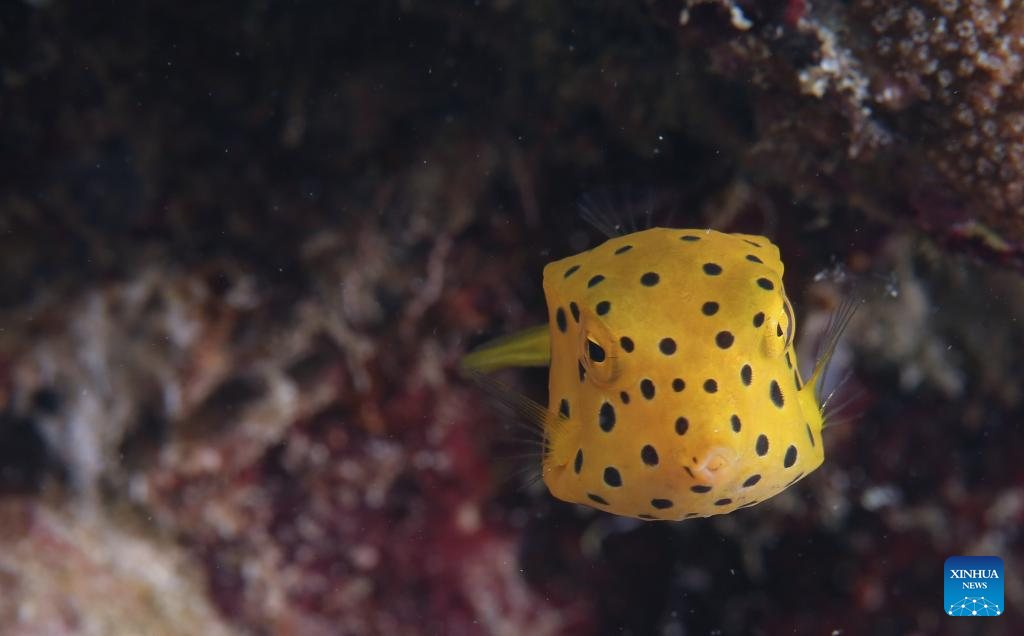
A yellow boxfish, Ostracion cubicus, is pictured in the Wuzhizhou Island's marine ranch in Sanya, south China's Hainan Province, May 15, 2024. Wuzhizhou Island's marine ranch, China's first tropical marine ranch, has made remarkable strides in marine ecological restoration and fishery resource conservation.
Artificial reefs are utilized worldwide to enhance ocean ecology, by creating additional habitats for local aquatic organisms and fish. As of April 2024, the marine ranch has deployed approximately 80,000 cubic meters of artificial reefs and ship-reefs. These efforts have created a thriving marine ecosystem, complete with coral reefs, fish, shrimp and shellfish.
Statistics reveal that over 51,000 corals have been successfully transplanted in the waters around Wuzhizhou Island. The area is now home to more than 300 species of coral reef fish, showcasing the rich biodiversity that has been nurtured through these conservation efforts. (Xinhua/Yang Guanyu)
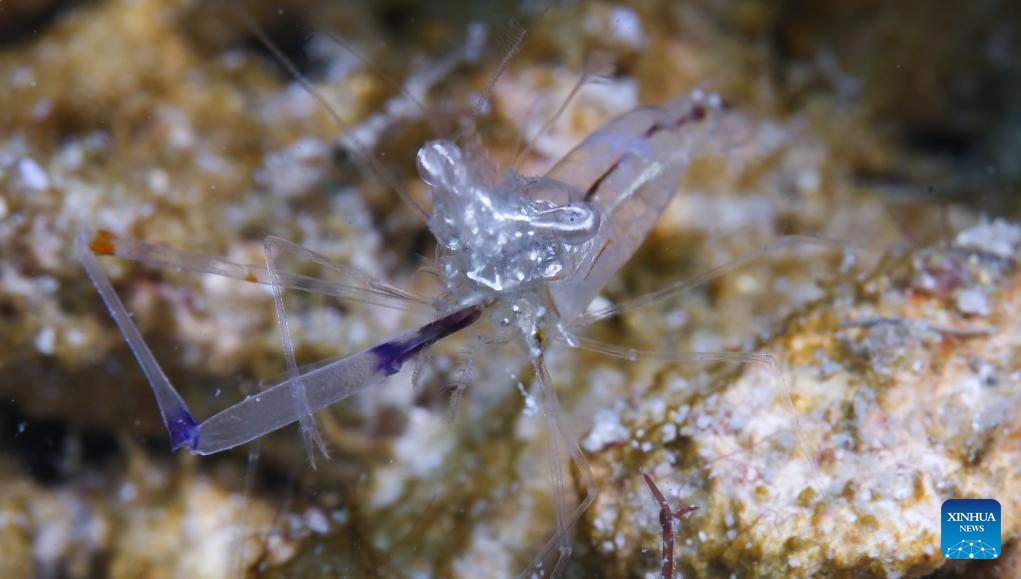
A Pederson cleaner shrimp is pictured in the Wuzhizhou Island's marine ranch in Sanya, south China's Hainan Province, May 15, 2024. Wuzhizhou Island's marine ranch, China's first tropical marine ranch, has made remarkable strides in marine ecological restoration and fishery resource conservation.
Artificial reefs are utilized worldwide to enhance ocean ecology, by creating additional habitats for local aquatic organisms and fish. As of April 2024, the marine ranch has deployed approximately 80,000 cubic meters of artificial reefs and ship-reefs. These efforts have created a thriving marine ecosystem, complete with coral reefs, fish, shrimp and shellfish.
Statistics reveal that over 51,000 corals have been successfully transplanted in the waters around Wuzhizhou Island. The area is now home to more than 300 species of coral reef fish, showcasing the rich biodiversity that has been nurtured through these conservation efforts. (Xinhua/Yang Guanyu)
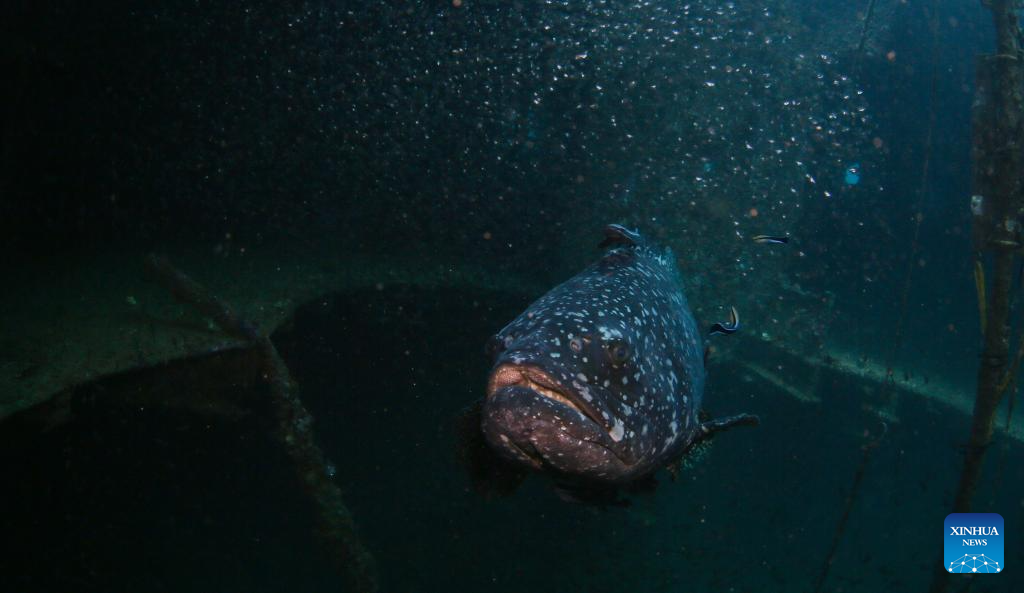
A grouper is pictured in the Wuzhizhou Island's marine ranch in Sanya, south China's Hainan Province, May 17, 2024. Wuzhizhou Island's marine ranch, China's first tropical marine ranch, has made remarkable strides in marine ecological restoration and fishery resource conservation.
Artificial reefs are utilized worldwide to enhance ocean ecology, by creating additional habitats for local aquatic organisms and fish. As of April 2024, the marine ranch has deployed approximately 80,000 cubic meters of artificial reefs and ship-reefs. These efforts have created a thriving marine ecosystem, complete with coral reefs, fish, shrimp and shellfish.
Statistics reveal that over 51,000 corals have been successfully transplanted in the waters around Wuzhizhou Island. The area is now home to more than 300 species of coral reef fish, showcasing the rich biodiversity that has been nurtured through these conservation efforts. (Xinhua/Yang Guanyu)
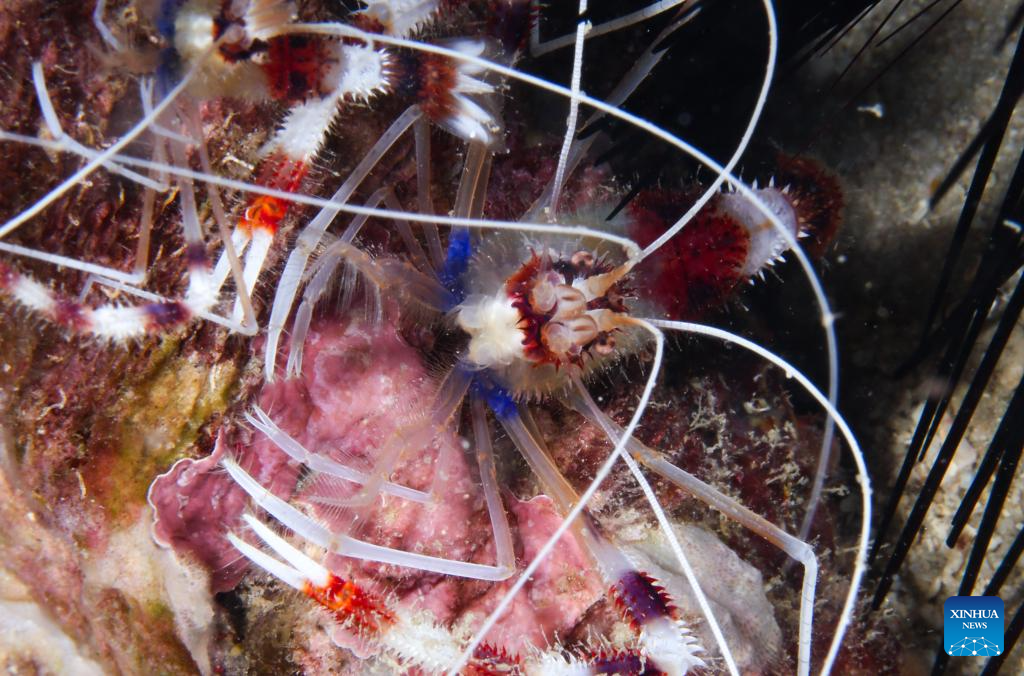
Blue banded coral shrimps are pictured in the Wuzhizhou Island's marine ranch in Sanya, south China's Hainan Province, May 16, 2024. Wuzhizhou Island's marine ranch, China's first tropical marine ranch, has made remarkable strides in marine ecological restoration and fishery resource conservation.
Artificial reefs are utilized worldwide to enhance ocean ecology, by creating additional habitats for local aquatic organisms and fish. As of April 2024, the marine ranch has deployed approximately 80,000 cubic meters of artificial reefs and ship-reefs. These efforts have created a thriving marine ecosystem, complete with coral reefs, fish, shrimp and shellfish.
Statistics reveal that over 51,000 corals have been successfully transplanted in the waters around Wuzhizhou Island. The area is now home to more than 300 species of coral reef fish, showcasing the rich biodiversity that has been nurtured through these conservation efforts. (Xinhua/Yang Guanyu)
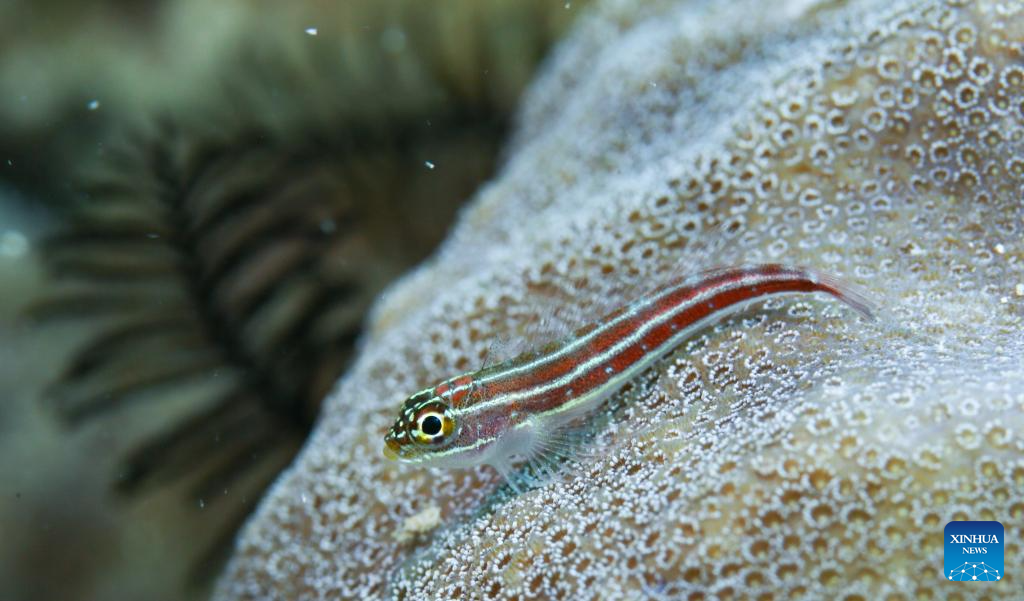
A tropical striped triplefin is pictured in the Wuzhizhou Island's marine ranch in Sanya, south China's Hainan Province, May 16, 2024. Wuzhizhou Island's marine ranch, China's first tropical marine ranch, has made remarkable strides in marine ecological restoration and fishery resource conservation.
Artificial reefs are utilized worldwide to enhance ocean ecology, by creating additional habitats for local aquatic organisms and fish. As of April 2024, the marine ranch has deployed approximately 80,000 cubic meters of artificial reefs and ship-reefs. These efforts have created a thriving marine ecosystem, complete with coral reefs, fish, shrimp and shellfish.
Statistics reveal that over 51,000 corals have been successfully transplanted in the waters around Wuzhizhou Island. The area is now home to more than 300 species of coral reef fish, showcasing the rich biodiversity that has been nurtured through these conservation efforts. (Xinhua/Yang Guanyu)
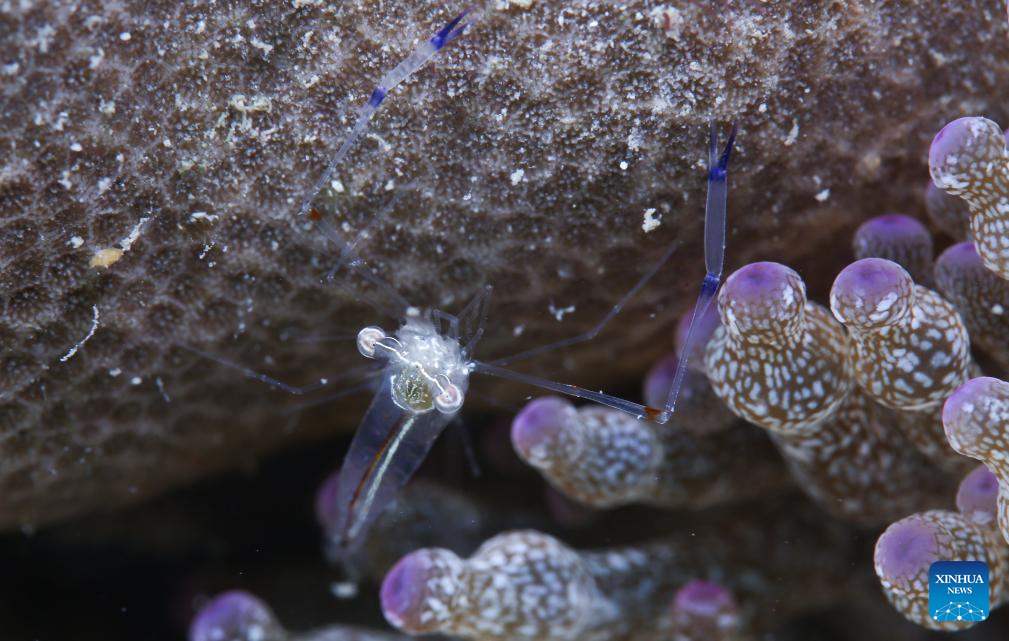
A Pederson cleaner shrimp is pictured in the Wuzhizhou Island's marine ranch in Sanya, south China's Hainan Province, May 15, 2024. Wuzhizhou Island's marine ranch, China's first tropical marine ranch, has made remarkable strides in marine ecological restoration and fishery resource conservation.
Artificial reefs are utilized worldwide to enhance ocean ecology, by creating additional habitats for local aquatic organisms and fish. As of April 2024, the marine ranch has deployed approximately 80,000 cubic meters of artificial reefs and ship-reefs. These efforts have created a thriving marine ecosystem, complete with coral reefs, fish, shrimp and shellfish.
Statistics reveal that over 51,000 corals have been successfully transplanted in the waters around Wuzhizhou Island. The area is now home to more than 300 species of coral reef fish, showcasing the rich biodiversity that has been nurtured through these conservation efforts. (Xinhua/Yang Guanyu)
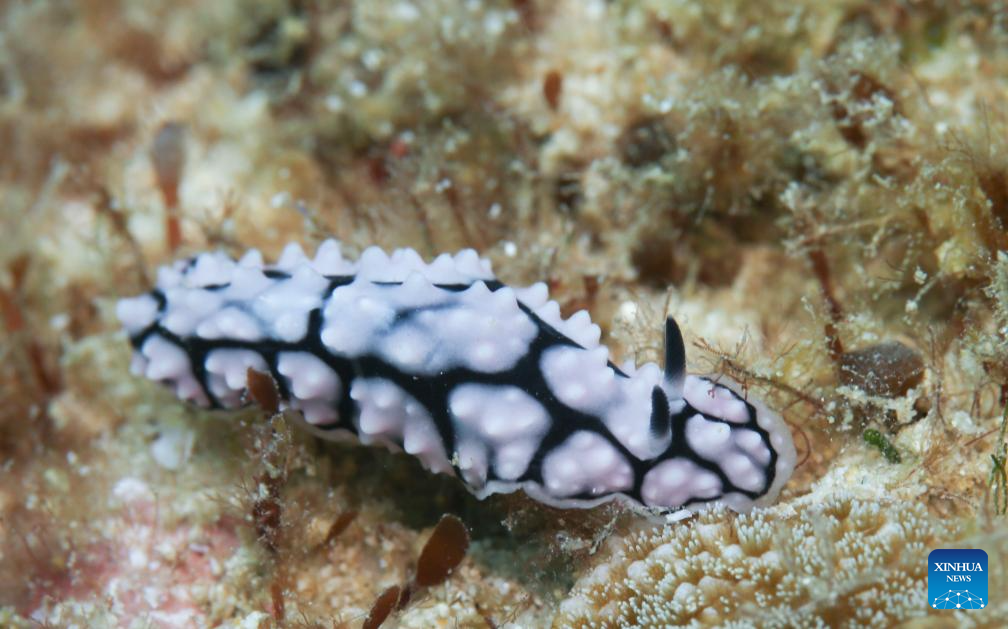
A phyllidiidae is pictured in the Wuzhizhou Island's marine ranch in Sanya, south China's Hainan Province, May 16, 2024. Wuzhizhou Island's marine ranch, China's first tropical marine ranch, has made remarkable strides in marine ecological restoration and fishery resource conservation.
Artificial reefs are utilized worldwide to enhance ocean ecology, by creating additional habitats for local aquatic organisms and fish. As of April 2024, the marine ranch has deployed approximately 80,000 cubic meters of artificial reefs and ship-reefs. These efforts have created a thriving marine ecosystem, complete with coral reefs, fish, shrimp and shellfish.
Statistics reveal that over 51,000 corals have been successfully transplanted in the waters around Wuzhizhou Island. The area is now home to more than 300 species of coral reef fish, showcasing the rich biodiversity that has been nurtured through these conservation efforts. (Xinhua/Yang Guanyu)
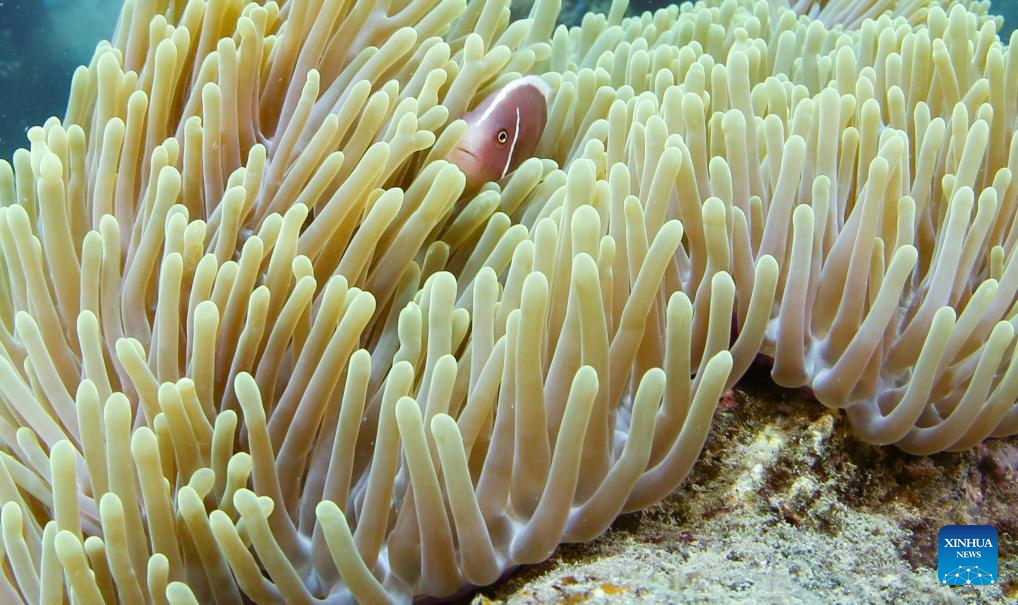
Sea anemones and a clownfish are pictured in the Wuzhizhou Island's marine ranch in Sanya, south China's Hainan Province, May 17, 2024. Wuzhizhou Island's marine ranch, China's first tropical marine ranch, has made remarkable strides in marine ecological restoration and fishery resource conservation.
Artificial reefs are utilized worldwide to enhance ocean ecology, by creating additional habitats for local aquatic organisms and fish. As of April 2024, the marine ranch has deployed approximately 80,000 cubic meters of artificial reefs and ship-reefs. These efforts have created a thriving marine ecosystem, complete with coral reefs, fish, shrimp and shellfish.
Statistics reveal that over 51,000 corals have been successfully transplanted in the waters around Wuzhizhou Island. The area is now home to more than 300 species of coral reef fish, showcasing the rich biodiversity that has been nurtured through these conservation efforts. (Xinhua/Yang Guanyu)



